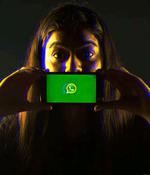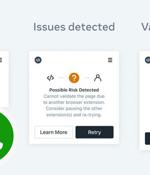Security News

A new WhatsApp phishing campaign impersonating WhatsApp's voice message feature has been discovered, attempting to spread information-stealing malware to at least 27,655 email addresses. Information-stealing malware is aggressively distributed today via various means, with phishing remaining a primary channel for threat actors.

A rendering technique affecting the world's leading messaging and email platforms, including Instagram, iMessage, WhatsApp, Signal, and Facebook Messenger, allowed threat actors to create legitimate-looking phishing messages for the past three years. The vulnerabilities are rendering bugs resulting in the apps' interface incorrectly displaying URLs with injected RTLO Unicode control characters, making the user vulnerable to URI spoofing attacks.

Meta Platforms' WhatsApp and Cloudflare have banded together for a new initiative called Code Verify to validate the authenticity of the messaging service's web app on desktop computers. Available in the form of a Chrome and Edge browser extension, the open-source add-on is designed to "Automatically verif[y] the authenticity of the WhatsApp Web code being served to your browser," Facebook said in a statement.

WhatsApp and Cloudflare have teamed up to provide desktop users of WhatsApp's web client with a browser extension called Code Verify that checks the integrity of the software running in their browser. The Meta-owned biz would like to add more security to its web client, because web security differs from native app security and WhatsApp is seeing more web usage.

WhatsApp and BlueJeans are just two of the world's most popular communication apps that are using an open-source library riddled with newfound security holes. On Monday, devops platform provider JFrog Security disclosed five memory-corruption vulnerabilities in PJSIP, which supplies an API that can be used by IP telephony applications such as voice-over-IP phones and conference apps.

Moxie Marlinspike, the founder of the popular encrypted instant messaging service Signal, has announced that he is stepping down as the chief executive of the non-profit in a move that has been underway over the last few months. "In other words, after a decade or more, it's difficult to overstate how important Signal is to me, but I now feel very comfortable replacing myself as CEO based on the team we have, and also believe that it is an important step for expanding on Signal's success," Marlinspike said in a blog post on Monday.

Moxie Marlinspike, the creator of the Signal secure messaging app, on Monday announced his resignation as CEO of the company. Marlinspike said he had always intended to grow Signal to the point that it could go on without his direct involvement but that wasn't possible as recently as four years ago when he was writing most of the code, managing employees, and personally handling support.

Facebook's parent company Meta Platforms on Monday said it has filed a federal lawsuit in the U.S. state of California against bad actors who operated more than 39,000 phishing websites that impersonated its digital properties to mislead unsuspecting users into divulging their login credentials. The attacks were carried out using a relay service, Ngrok, that redirected internet traffic to the phishing websites in a manner that concealed the true location of the fraudulent infrastructure.

WhatsApp announced today that it had expanded the privacy control features with the addition of default disappearing messages for all newly initiated chats. Today, with the launch of default disappearing messages, the company also added two new durations that allow setting up messages to disappear after 24 hours or 90 days.

Spyware maker NSO Group cannot use its government clients to shield itself from litigation, a US appeals court ruled on Monday, a decision that allows WhatsApp's lawsuit against the Israel-based firm to resume. In 2019, Facebook and its WhatsApp subsidiary sued NSO claiming the firm's intrusion software, known as Pegasus, was used to unlawfully compromise the accounts of WhatsApp customers.